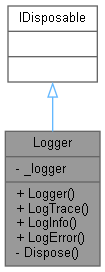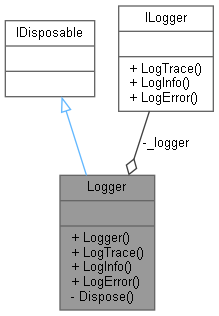Represents the logger object to be used in the program. More...


Public Types | |
| enum | LoggerTypes { ToNull , ToFile , ToConsole } |
| A value passed to Logger.Logger() constructor to specify the type of logger to create. More... | |
Public Member Functions | |
| Logger (LoggerTypes loggerType, params string[] arguments) | |
| Constructor that takes a LoggerTypes value and optional arguments to create a new Logger class. | |
| void | LogTrace (string message) |
| Log trace messages to the configured output. | |
| void | LogInfo (string message) |
| Log informational messages to the configured output. | |
| void | LogError (string message) |
| Log error messages to the configured output. | |
Private Member Functions | |
| void IDisposable. | Dispose () |
| Dispose of this logger object in a friendly way. | |
Private Attributes | |
| ILogger? | _logger |
| The logger implementation represented by the ILogger interface. | |
Detailed Description
Represents the logger object to be used in the program.
This class wraps different implementations of loggers to show the Bridge Pattern.
Definition at line 15 of file Bridge_Logger.cs.
Member Enumeration Documentation
◆ LoggerTypes
| enum LoggerTypes |
A value passed to Logger.Logger() constructor to specify the type of logger to create.
Definition at line 21 of file Bridge_Logger.cs.
Constructor & Destructor Documentation
◆ Logger()
|
inline |
Constructor that takes a LoggerTypes value and optional arguments to create a new Logger class.
- Parameters
-
loggerType A value from the LoggerTypes enum specifying the type of logger object to create. arguments Zero or more additional arguments that some logger types require. For example, a file logger requires a filename.
Definition at line 47 of file Bridge_Logger.cs.
References Logger._logger, ConsoleLogger.CreateConsoleLogger(), FileLogger.CreateFileLogger(), and NullLogger.CreateNullLogger().
Member Function Documentation
◆ Dispose()
|
inlineprivate |
Dispose of this logger object in a friendly way.
Definition at line 124 of file Bridge_Logger.cs.
References Logger._logger.
◆ LogError()
|
inline |
Log error messages to the configured output.
- Parameters
-
message The message to log.
Definition at line 111 of file Bridge_Logger.cs.
References Logger._logger, and ILogger.LogError().
Referenced by Bridge_Exercise._Bridge_Exercise_Demonstrate_Logging().
◆ LogInfo()
|
inline |
Log informational messages to the configured output.
- Parameters
-
message The message to log.
Definition at line 99 of file Bridge_Logger.cs.
References Logger._logger, and ILogger.LogInfo().
Referenced by Bridge_Exercise._Bridge_Exercise_Demonstrate_Logging().
◆ LogTrace()
|
inline |
Log trace messages to the configured output.
- Parameters
-
message The message to log.
Definition at line 87 of file Bridge_Logger.cs.
References Logger._logger, and ILogger.LogTrace().
Referenced by Bridge_Exercise._Bridge_Exercise_Demonstrate_Logging().
Member Data Documentation
◆ _logger
|
private |
The logger implementation represented by the ILogger interface.
Definition at line 140 of file Bridge_Logger.cs.
Referenced by Logger.__exit__(), Logger.Close(), Logger.Dispose(), Logger.LogError(), Logger.Logger(), Logger.LogInfo(), and Logger.LogTrace().
The documentation for this class was generated from the following file: